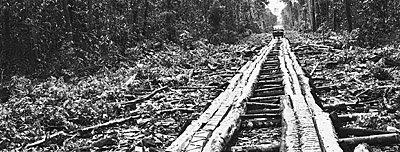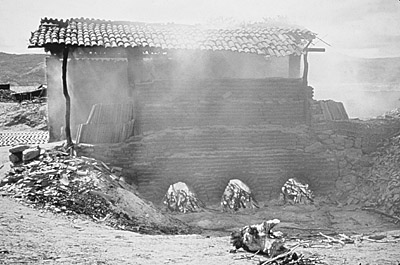


Le cas d'un chercheur brésilien en dendroénergie, M. Luiz Augusto Horta Nogueira, illustre la créneau qu'offre le Programme d'experts invités des établissements universitaires et instituts de recherche de diffuser les connaissances disponibles dans ce domaine.
M. Nogueira, qui enseigne la thermodynamique appliquée et l'utilisation des bioénergies à l'École fédérale d'ingénieurs d'Itajuba, dans l'État de Minas Gerais (Brésil), a pris un congé sabbatique pour passer
12 mois à la FAO. Durant son affectation au Groupe de dendroénergie, il a participé à l'exécution d'activités réalisées par le Groupe, notamment à l'examen du système actuellement utilisé pour réunir et présenter des statistiques et des informations sur les combustibles à base de bois collectées dans le cadre du WETT (La dendrologie aujourd'hui pour satisfaire les besoins futurs).
El Dr. Nogueira, profesor universitario en termodinámica aplicada y utilización de la bioenergía en la Escuela Federal de Ingeniería de Itajuba, en el estado de Minas Gerais, Brasil, aprovechó recientemente su licencia sabática en la facultad para colaborar doce meses con la FAO.
El ejemplo de este investigador brasileño de energía de la madera ilustra las oportunidades que los expertos visitantes del Programa de instituciones académicas y de investigación ofrecieron para adquirir nuevas ideas y apreciaciones en su campo de competencia. Durante su misión con el Grupo de Energía de la Madera de la FAO, contribuyó a desarrollar varias actividades realizadas por este Grupo. Entre otras, colaboró en revisar el sistema actual empleado para la compilación y presentación de datos estadísticos y de información sobre combustibles de la madera que se han recogido en el ámbito del WETT (Energía de la madera de hoy para mañana).
![]()
Many different kinds of woodfuels and technologies that harness forest energy are applied in many situations and cases. These cases range from fuelwood utilization for cooking in poor areas of developing countries to burning black liquor fuels in modern pulp and paper industries in highly industrialized countries.
There are many possible directions for developing studies and carrying out research activities on wood energy, or "dendroenergy", to improve our understanding of this increasingly important topic; however, most of them are little known.
The case of a Brazilian wood energy researcher, Luiz Augusto Horta Nogueira, illustrates the "window of opportunity" that the Visiting Experts from Academic and Research Institutions Programme offered to acquire new insights in his field. Nogueira, a lecturer in applied thermodynamics and bioenergy utilization at the Itajubá Federal School
 
A wood-fired brick kiln in Rio Grande do Sul, Brazil |
WETT is the major mechanism for the collection of existing information and data on woodfuels and related energy aspects at the national level, including data on production, consumption and trade of different woodfuels. These data are fundamental in determining: how, where and how much woodfuel is used in different countries and regions; the contribution of forests, woodlands and trees to the energy sector; the implementation of more detailed GHG inventories; and a better understanding of wood energy systems and the planning of more sustainable production and utilization.
Nogueira also helped with the incorporation of woodfuel data into the Wood Energy Information System (WEIS), especially with the data available from Latin American countries. WEIS is expected to become the main source of information and data available on woodfuel production and consumption for many public and private organizations, as well as R&D centres of forest services and energy units.
During his stay, Nogueira played a key role in organizing the Regional Meeting on Biomass for Energy and Food Production for the focal points of FAO's Latin American Technical Cooperation Network on Dendroenergy, which was held in Havana, Cuba, from 3 to 6 November 1997. He was also able to review the technical issues involved in a forthcoming textbook on wood energy for use by university and college engineering and forestry students.
"The programme has considerably expanded my view of wood energy features and potential throughout the world," Nogueira comments. "In this sense, this is one of the most interesting jobs I have ever done. For someone interested in research, there is good support. FAO's staff have introduced me to more global issues and a set of problems on wood energy aspects and issues that I have never considered before."